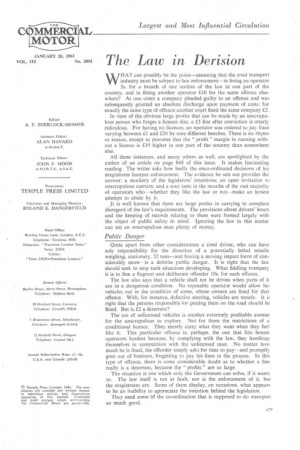Public Danger
Page 31

If you've noticed an error in this article please click here to report it so we can fix it.
Quite apart from other considerations a tired driver, who can have sole responsibility for the direction of a potentially lethal missile weighing, stationary, 32 tons—and having a moving impact force of considerably more—is a definite public danger. It is right that the law should seek to stop such situations developing. What fiddling trumpery it is to fine a flagrant and deliberate offender 10s. for each offence.
The law also says that a vehicle shall not be driven when parts of it are ii/. a dangerous condition. No reputable operator. would allow his vehicles out in the condition of some, whose owners are fined for that offence. With, for instance, defective steering, vehicles are unsafe. It is right that the persons responsible for putting them on the road should be fined. But is £2. a deterrent?
The use of unlicensed vehicles is another extremely profitable avenue for the unscrupulous to explore. Not for them the, restrictions of a conditional licence. They merely carry what they want when they feel like it. This particular offence is, perhaps, the one that hits honest operators hardest because, by complying with the law, they handicap themselves in competition with the unlicensed man. No matter how much he is fined, the offender simply asks for time to pay—and promptly goes out of business, forgetting to pay his fines in the process. In this type of offence, there is some considerable doubt as to whether a fine really is a deterrent, because the " profits" are so large.
The situation is one which only the Government can solve, if it wants to. The law itself is not at fault, nor is the enforcement of it, but the magistrates are. Some of them display, on occasions, what appears to be an inability to appreciate the intention behind the legislation.
They need some of the co-ordination that is supposed to do transport so much good.




















































































































